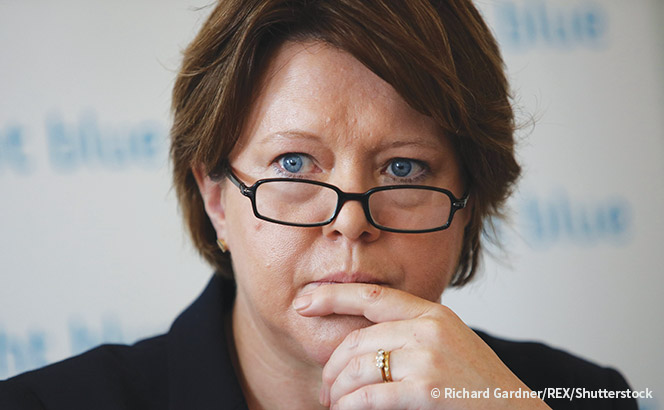A parliamentary select committee has condemned the ‘routine cover-up’ of discrimination allegations by employers as calls for a clampdown on non-disclosure agreements (NDAs) reach a new pitch.
The report by the Women and Equalities Committee on discrimination and harassment in the workplace, published today (11 June), is the culmination of an enquiry launched by MPs in the wake of the #MeToo movement that saw the legal profession’s handling of gagging orders thrown into the spotlight.
It builds on a previous report, published last July, specifically focused on the unseemly use of NDAs in sexual harassment cases which levelled criticism at the government, employers and regulators for their inaction in stamping out the problem.
The new report centres on evidence of ‘the routine cover-up’ of allegations of unlawful discrimination and harassment in the workplace and a failure by employers to investigate properly or at all.
Chair of the Women and Equalities Committee, Maria Miller MP (pictured), said: ‘We heard during our previous inquiry into sexual harassment in the workplace that the current use of non-disclosure agreements in settling such allegations is at best murky and at worst a convenient vehicle for covering up unlawful activity with legally sanctioned secrecy.’
She added: ‘It is particularly worrying that secrecy about allegations of unlawful discrimination is being traded for things that employers should be providing as a matter of course, such as references and remedial action to tackle discrimination.’
‘Organisations have a duty of care to provide a safe place of work for their staff and that includes protection from unlawful discrimination. Some organisations now routinely settle employment disputes without the use of NDAs. We have put forward a range of measures to ensure more follow suit.’
The committee has urged the government to address the failure of the employment tribunal system to ensure all employees who have experienced discrimination have a meaningful route of redress.
The committee also repeated its previous call for the government to place a mandatory duty on employers to protect workers from harassment and victimisation in the workplace and improve the remedies that can be awarded by employment tribunals as well as the costs regime to reduce disincentives to taking a case forward.
‘Tribunals should be able to award punitive damages, and awards for the non-financial impact of discrimination should be increased significantly’, the committee found.
The report highlights the role of regulators in tackling the thorny issue around the misuse of gagging orders. The committee lent its weight to the argument that the Law Society’s recent practice note on the use of NDAs should be revisited.
The view chimes with that of Crispin Passmore, the former executive director of the Solicitors Regulation Authority (SRA), who last month slammed The Law Society’s document and called for it to be scrapped altogether.
The Law Society guidance was published in January, ten months after the SRA issued its own warning notice to solicitors in March 2018 on the appropriate use of such contracts.
Passmore criticised the Law Society’s version for being less ethically robust than its SRA counterpart, allowing a lack of consistency among employment practitioners. He told Legal Business at the time: ‘Employment lawyers have complained the Law Society document doesn’t help them at all. Some have complained of lawyers on the other side trying things they shouldn’t, according to the SRA notice, because they are instead looking at the Law Society’s advice.’
Richard Moorhead, professor of law and professional ethics at University College London, cited similar concerns: ‘The guidance is weak or positively unhelpful. The guidance is mealy mouthed and weak on the risks of the NDA and misses out things that practitioners are concerned over, such as clawbacks. It doesn’t say it’s OK to withhold the document from the parties but it keeps the door open to that possibility. It appears to contradict the SRA warning notice.’
The debate came amid claims that Chancery Lane effectively watered down more robust recommendations on NDAs from its employment law committee.
Today’s report also flags that the Bar Standards Board (BSB), which regulates barristers, in February told the select committee that formal regulatory guidance on NDAs was ‘neither necessary nor appropriate’ because the conduct of barristers was already covered by the BSB handbook and code of conduct and because it is for Parliament to legislate on whether the use of NDAs should be restricted or made unlawful. Professor Richard Moorhead called the decision ‘regrettable’ and should be revisited.
nathalie.tidman@legalease.co.uk
The committee’s recommendations
- That the government ensure NDAs cannot prevent legitimate discussion of allegations of unlawful discrimination or harassment and stop their use to cover up allegations of unlawful discrimination, while still protecting the rights of victims
- Require standard, plain English confidentiality, non-derogatory and similar clauses where these are used in settlement agreements, and ensure that such clauses are suitably specific about what information can and cannot be shared and with whom
- Strengthen corporate governance requirements to require employers to meet their responsibilities to protect those they employ from discrimination and harassment
- Require named senior managers at board level or similar to oversee anti-discrimination and harassment policies and procedures and the use of NDAs in discrimination and harassment cases.











